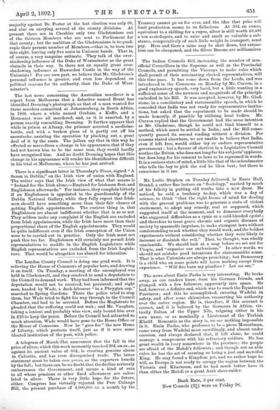The Indian Councils Bill, increasing the number of non- official
Councillors in the Supreme as well as the Provincial Councils, and permitting the Viceroys to make rules which shall permit of their nominating elected representatives, will this time pass. It has come down from the Lords, and was introduced in the Commons on Monday by Mr. Curzon, in a good explanatory speech, very lucid, but a little wanting in a sufficient sense of the newness and magnitude of the principle embodied in his Bill. It was accepted, however, by Mr. Glad- stone, in a conciliatory and statesmanlike speech, in which he conceded that India was not ready for representative institu- tions, but asked that the experiment to be made should be made honestly, if possible by utilising local bodies. Mr. Curzon replied that the Government had the same intention as Mr. Gladstone, though he could not bind himself to a method, which must be settled in India; and the Bill conse- quently passed its second reading without a division. For reasons stated elsewhere, we are unable to believe that India, even if left free, would either try or endure representative government ; but a flavour of election in a Legislative Council soothes the Briton, who does not long for his subjects' applause, but does long for his consent to laws to be expressed in words. It is a curious state of mind, a little like that of the schoolmaster who tells the boy to pick the rod he likes best; but there is conscience in it too.


































 Previous page
Previous page